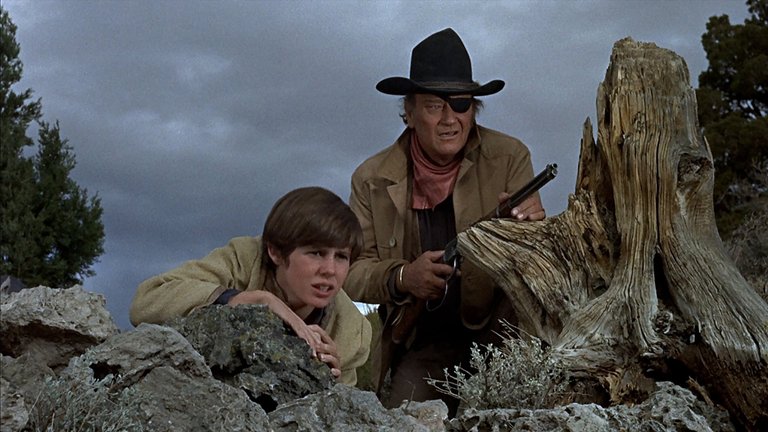
John Wayne, a towering figure in American cinema, is often synonymous with the traditional Western genre. His reactionary political views and iconic roles have come to embody the very essence of the myths and values that many young people in the late 1960s and early 1970s rebelled against. Despite this cultural shift, Wayne's films during this period, particularly True Grit (1969), achieved remarkable commercial success. This paradox raises questions about how Wayne managed to resonate with the emerging youth culture of the Baby Boomer generation. In True Grit, directed by Henry Hathaway, Wayne delivers one of his most celebrated performances as Rooster Cogburn, a role that not only won him an Academy Award for Best Actor but also served as a symbolic bridge between the older and younger generations. The film encapsulates this generational divide and reconciliation.
True Grit is adapted from Charles Portis's 1968 novel and unfolds in 1880s Arkansas. The plot kicks off with the murder of wealthy rancher Frank Ross (played by John Pickard) by his treacherous employee Tom Chaney (played by Jeff Corey). Following her father's death, 14-year-old Mattie Ross (Kim Darby) arrives in Fort Smith to settle his affairs. However, she quickly discovers that authorities are either unwilling or unable to pursue Chaney, who has fled into Indian Territory (modern-day Oklahoma) and joined a gang led by the notorious outlaw Lucky Ned Pepper (played by Robert Duvall). Determined to seek justice, Mattie hires the infamous U.S. Marshal Reuben "Rooster" J. Cogburn, portrayed by Wayne. Despite his age, obesity, alcoholism, and missing eye, Rooster has built a reputation for his lethal efficiency against outlaws. Reluctantly, he agrees to take Mattie along on their perilous journey into Indian Territory, where they are later joined by Texas Ranger La Boeuf (played by Glen Campbell), who also seeks Chaney.
Wayne's portrayal of Rooster Cogburn can be viewed as a nuanced deconstruction of the classic Western hero archetype. Unlike the invincible lawman of traditional Westerns, Rooster is depicted as a flawed individual whose imperfections mirror those of America itself in late 1960s. His character embodies a sense of nostalgia for better days while simultaneously revealing an ugly side. Beneath his gruff exterior lies a man capable of doing what is right and serving as a surrogate father figure to Mattie. Wayne masterfully balances his inherent charisma with Rooster's rough edges, creating a character that resonates deeply with audiences and ultimately earned him an Oscar.
In stark contrast to Rooster's character is Mattie Ross, who represents a significant departure from conventional female roles in Westerns. Portrayed by Kim Darby, whose short hair and determined demeanour defy traditional femininity, Mattie is far from the typical femme fatale or damsel in distress. Her quest for justice challenges societal expectations associated with her age and gender. Rather than relying on beauty or charm, she employs intelligence and business acumen to navigate her father's murder case. In many respects, Mattie emerges as a feminist icon within the narrative; however, some contemporary viewers may find her relationship with Rooster as a surrogate father figure at odds with this characterization.
The film’s success can also be attributed to its strong supporting cast, which includes celebrated character actors such as Strother Martin and Robert Duvall alongside Dennis Hopper in a memorable role as one of Pepper's gang members. While country singer Glen Campbell’s acting may not match that of his co-stars, he compensates for this with his performance of the film's catchy title song.
True Grit is enriched by its well-crafted characters and sharp dialogue, much of which stems from Marguerite Roberts' screenplay adapted from Portis' novel. The film features numerous humorous moments that add levity amidst its darker themes; this blend of comedy and drama contributes significantly to its enduring popularity. The witty exchanges between characters often highlight their personalities while underscoring the absurdities of their situations.
However, despite its strengths, True Grit does exhibit some shortcomings attributable to director Henry Hathaway’s age at the time of filming. While Hathaway was a seasoned veteran in Hollywood, certain aspects of his direction appear somewhat dated or lack ambition when compared to contemporary standards. The cinematography by Lucien Ballard is commendable; nonetheless, there are moments where the film resembles an unremarkable television production rather than a major cinematic release. The pacing falters towards the end as well; both the final showdown and overall conclusion feel unnecessarily prolonged and could have benefited from tighter direction.
Overall, True Grit leaves a positive impression on audiences even today. Its blend of humour, engaging performances, and compelling storytelling ensures its status as a classic Western film. The success of True Grit led Wayne to reprise his iconic role in the 1975 sequel Rooster Cogburn, while Warren Oates took on the character in the 1978 television film True Grit: A Further Adventure. Additionally, the Coen Brothers' 2010 remake further solidified the story's place in American cinematic history while introducing it to new generations.
RATING: 7/10 (+++)
Blog in Croatian https://draxblog.com
Blog in English https://draxreview.wordpress.com/
InLeo blog https://inleo.io/@drax.leo
Hiveonboard: https://hiveonboard.com?ref=drax
Rising Star game: https://www.risingstargame.com?referrer=drax
1Inch: https://1inch.exchange/#/r/0x83823d8CCB74F828148258BB4457642124b1328e
BTC donations: 1EWxiMiP6iiG9rger3NuUSd6HByaxQWafG
ETH donations: 0xB305F144323b99e6f8b1d66f5D7DE78B498C32A7
BCH donations: qpvxw0jax79lhmvlgcldkzpqanf03r9cjv8y6gtmk9
Posted Using InLeo Alpha